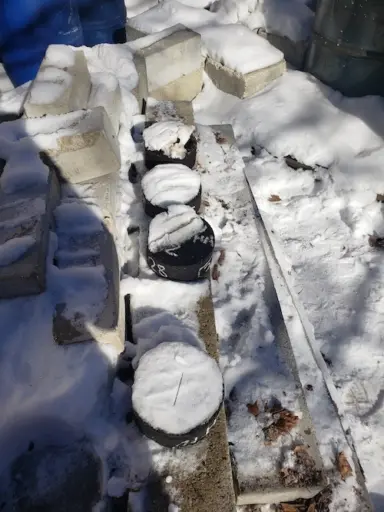Over the winter, passersby may have wondered why Dalila Ricci and Keerthana Sreenivasan were huddled in the field behind the structures lab in Engineering Hall pouring pickle and cheese brine on chunks of asphalt and wiping concrete with coffee grounds.
It wasn’t some sort of weird culinary adventure; rather, the two, who call themselves the Bubble Tea Buddies, were engaged in serious science, trying to determine if any of the food production byproducts work as well as rock salt at deicing roads. Braving the ice and snow and scrounging asphalt and food waste was worth the effort: The duo won the $5,000 top prize in the 2020 Innovation in CEE Competition in early May 2020.
 Asphalt treated with pickle juice, cheese brine and rock salt melt snow.
Asphalt treated with pickle juice, cheese brine and rock salt melt snow.
The Bubble Tea Buddies and four other teams presented radically different projects to a panel of judges during the competition, sponsored by Appleton, Wisconsin-based The Boldt Company and the Department of Civil and Environmental Engineering. The entries did have one thing in common: they all push civil and environmental engineering in new and exciting directions. In fact, that’s what the competition, now in its second year, is all about.
For their winning project, environmental engineering major Sreenivasan, who graduated in May 2020, and Ricci, currently a senior, decided to see if there was a more environmentally friendly and economical alternative to the tons of rock salt strewn on sidewalks, streets and highways to melt ice throughout the winter months. The salt pollutes nearby waterways and also causes concrete to deteriorate.
The two compared the deicing abilities of pickle brine, filtered cheese brine, unfiltered cheese brine, coffee grounds and rock salt on concrete and asphalt. While rock salt was the clear winner when it came to providing traction and deicing concrete, the team did find that pickle brine was almost as effective as salt when applied to asphalt, and with a lower environmental impact. The juice, however, almost didn’t make it into the experiment. “I went to a lot of places to get pickle juice before finding some at Der Rathskeller in the Memorial Union,” Sreenivasan says. “That was the hardest to get!”
Kate Tobin, a sophomore in geological engineering, won second place for constructing a modular data acquisition device that allows users to plug in various sensors. Currently, she says, a geological engineer needs to buy a full knapsack of devices to operate in the field. With her device, one box can run many different sensors, including an accelerometer, temperature and humidity gauge and can be coded to accept others.
Third place winner Parcovis Consulting, including graduating CEE seniors Alison Pagel, Briana Shea, Nikolas Ohuafi, Christian Kirchberg and geological engineering senior Gylf Forsberg, presented an improvement plan for Vilas Park on the shore of Lake Wingra in Madison developed as their senior capstone project. In their design, created in conjunction with the Clean Lakes Alliance, the team addressed shoreline erosion and traffic speeds by moving the road winding through the park, adding bioswales, and removing a parking lot. They also included a new beach shelter housing a system to filter water in the swimming area, which is often closed due to blue-green algae in the summer.
Two teams earned honorable mentions. Farmers Only, which includes May 2020 civil engineering graduate Luke Burlingame and May 2020 industrial engineering and computer science graduate Kyle Schneider, put together a plan to repurpose abandoned buildings as urban farms using space-saving shelving units similar to those used in libraries. Civils for UpCycle, including May 2020 CEE graduate Eleanor Escobar and CEE seniors Erik Frank and Lamin Moore, presented a process that extracts gypsum from fly ash produced by coal-burning power plants, making the ash suitable for use in Portland cement.
For first place winner Sreenivasan, the project proved to be a great way to finish her undergrad studies. “It was a perfect end to my time here,” she says. “I don’t want to see this project end. I think there’s potential in the research that we did. It would be great if people took it forward.”
The Boldt Company is committed to sponsoring the annual event. Civil and Environmental Engineering Assistant Professors Pavana Prabhakar and Jesse Hampton and university relations specialist Amanda Thuss helped organize the event, while Assistant Professors Zhenhua Zhu and Nimish Pujara, Associate Professor Matthew Ginder-Vogel, and Professor Chin Wu served as judges.